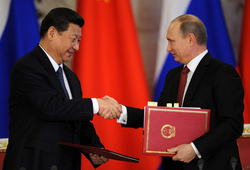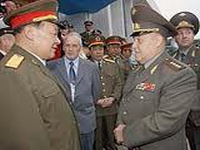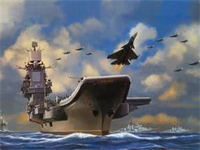Moscow-Beijing axis - - a threat real or imagined?
By Toby Westerman
For years this column has argued that there is a solid alliance between Russia and China, and that this alliance constitutes a direct military challenge to the United States. To ignore this threat endangers the security of the people of the United States. This seems to be a minority opinion, however, and one of the many experts who disagree with this analysis is Jeffrey Mankoff, the Deputy Director for the Russia and Eurasia Program at the Center for Strategic and International Studies in Washington, D.C.
 In a recent New York Times op ed article, The Wary Chinese-Russian Partnership, Mankoff states that "their cooperation is mostly tactical," and that "The two countries approach the world from quite different vantage points."
In a recent New York Times op ed article, The Wary Chinese-Russian Partnership, Mankoff states that "their cooperation is mostly tactical," and that "The two countries approach the world from quite different vantage points."
Mankoff sees Russia and China as rivals in Southeast Asia and Central Asia as much as allies standing together against the United States. Mankoff also cites unnamed Russian commanders who see China as a potential threat, and he cites recent military exercises in Russia's Far East as evidence of this concern. Despite their differences, Moscow and Beijing continue an uneasy "tactical" relationship, according to Mankoff.
Mankoff's analysis leads him to conclusions which have far-reaching implications for the United States and the world. Mankoff argues that the U.S. must give Russia and China "more of a stake in running the world" equal to traditional U.S. partners, especially in Asia where "a new security architecture is still being designed."
If we fail to do as he suggests, Mankoff states that "the alternative is bringing the Chinese-Russian axis that U.S. policy makers fear closer to reality."
 One basic problem with the Markoff analysis is that the "Chinese-Russian axis that U.S. policy makers fear" is already here. Whatever differences they may have between each other, Moscow and Beijing are determined to remain united against the U.S. and expand their power at the expense of America. Once the U.S. is out of the way, Moscow and Beijing may have disagreements, but that would be little comfort to a subjugated United States.
One basic problem with the Markoff analysis is that the "Chinese-Russian axis that U.S. policy makers fear" is already here. Whatever differences they may have between each other, Moscow and Beijing are determined to remain united against the U.S. and expand their power at the expense of America. Once the U.S. is out of the way, Moscow and Beijing may have disagreements, but that would be little comfort to a subjugated United States.
Russia and China are presently not only rapidly building up their military forces to rival those of the United States, but are ensuring these forces can act together. Moscow and Beijing also support every anti-U.S. regime around the world from Iran to Cuba. Russia and China even have plans for joint space exploration. If we take all this taken together, Moscow and Beijing seem to have gone far beyond a mere "tactical" understanding.
Mankoff undermines our allies and our values as a free nation when he argues that Russia and China should have "more of a stake in running the world" and should be placed on "an equal footing with traditional U.S. partners," especially in Asia, "where a new security architecture is still being designed,."
Our "traditional" allies all have similar political and economic interests, which include free elections and an openness to free market competition. Neither free markets or free elections exist to any real extent in Russia or China. Russia is a nation controlled by its spy agencies (many still refer to the "KGB"), and China remains in the grip of an unrelenting Communist Party elite. Elections, like markets, exist to maintain the totalitarian power structure in both Russia and China.
Under these circumstances, any greater "stake in running the world" for Moscow and Beijing would be a disaster for the United States and its allies. This would be particularly true and first felt in Asia, where Mankoff sees the evolution of "a new security architecture."
One of the components of this "new security architecture" is seen in the Russian-Chinese joint naval exercises recently held in the Sea of Japan. These exercises both increase the ability of Russia and China to coordinate their military capabilities, but also offer a stark warning to America's allies that soon there may be a very shift in the regions balance of power.
 The naval exercises come at a time when China is aggressively asserting its claim over much of the South China Sea, a vital shipping lane, where a string of uninhabited islands may hold large gas deposits. American allies Japan, Philippines, and Taiwan dispute China's claims and military tensions in the region are high. Australia, another U.S. friend, is taking careful note of the increasingly ominous actions of the Chinese dragon.
The naval exercises come at a time when China is aggressively asserting its claim over much of the South China Sea, a vital shipping lane, where a string of uninhabited islands may hold large gas deposits. American allies Japan, Philippines, and Taiwan dispute China's claims and military tensions in the region are high. Australia, another U.S. friend, is taking careful note of the increasingly ominous actions of the Chinese dragon.
Mankoff's op ed piece seems to suggest that the U.S. is somehow arbitrarily inhibiting the international influence of Russia and China. Mankoff asserts that the U.S. must learn that "the more it dismisses Russian and Chinese demands that their concerns be taken into account" the greater the chance of a Chinese-Russian axis will become "self-fulfilling."
We have discussed above the functioning reality of the "Chinese-Russian axis," but what "concerns" of Russia and China are being dismissed by the U.S.? Russia invaded Georgia and we were able to do nothing. The bloody Russian-backed Assad regime in Syria appears to have the upper hand with the Islamic rebels. China all but threatens war in the South China Sea. What concerns are we not addressing? Do we hand over Taiwan? Allow Japan to become a Chinese vassal state? Turn our back to Australia and the Philippines?
Far from standing in the way of their development, in great measure we have made possible the military modernization programs in China and Russia which now threaten our allies.
Before America's huge investments flowed into Russia and China, the Chinese military was barely able to keep its own people in line, and, following the collapse of the Soviet Union, Russia's military could not project power beyond its own borders. Thanks to America's commercial and financial relationships, however, all that has changed. America now stands as the only logical target of the increasingly sophisticated military forces of Russia and China.
In World War II the United States and its allies (ironically, including China under anti-Communist Chiang kai-shek and Russia which was a member of the Soviet Union) defeated one "axis." Now we must be ready to stand with our present allies to face another "axis," even if Dr. Mankoff is reluctant to acknowledge its present reality.
© Toby Westerman
July 23, 2013
For years this column has argued that there is a solid alliance between Russia and China, and that this alliance constitutes a direct military challenge to the United States. To ignore this threat endangers the security of the people of the United States. This seems to be a minority opinion, however, and one of the many experts who disagree with this analysis is Jeffrey Mankoff, the Deputy Director for the Russia and Eurasia Program at the Center for Strategic and International Studies in Washington, D.C.
 In a recent New York Times op ed article, The Wary Chinese-Russian Partnership, Mankoff states that "their cooperation is mostly tactical," and that "The two countries approach the world from quite different vantage points."
In a recent New York Times op ed article, The Wary Chinese-Russian Partnership, Mankoff states that "their cooperation is mostly tactical," and that "The two countries approach the world from quite different vantage points."Mankoff sees Russia and China as rivals in Southeast Asia and Central Asia as much as allies standing together against the United States. Mankoff also cites unnamed Russian commanders who see China as a potential threat, and he cites recent military exercises in Russia's Far East as evidence of this concern. Despite their differences, Moscow and Beijing continue an uneasy "tactical" relationship, according to Mankoff.
Mankoff's analysis leads him to conclusions which have far-reaching implications for the United States and the world. Mankoff argues that the U.S. must give Russia and China "more of a stake in running the world" equal to traditional U.S. partners, especially in Asia where "a new security architecture is still being designed."
If we fail to do as he suggests, Mankoff states that "the alternative is bringing the Chinese-Russian axis that U.S. policy makers fear closer to reality."
 One basic problem with the Markoff analysis is that the "Chinese-Russian axis that U.S. policy makers fear" is already here. Whatever differences they may have between each other, Moscow and Beijing are determined to remain united against the U.S. and expand their power at the expense of America. Once the U.S. is out of the way, Moscow and Beijing may have disagreements, but that would be little comfort to a subjugated United States.
One basic problem with the Markoff analysis is that the "Chinese-Russian axis that U.S. policy makers fear" is already here. Whatever differences they may have between each other, Moscow and Beijing are determined to remain united against the U.S. and expand their power at the expense of America. Once the U.S. is out of the way, Moscow and Beijing may have disagreements, but that would be little comfort to a subjugated United States.Russia and China are presently not only rapidly building up their military forces to rival those of the United States, but are ensuring these forces can act together. Moscow and Beijing also support every anti-U.S. regime around the world from Iran to Cuba. Russia and China even have plans for joint space exploration. If we take all this taken together, Moscow and Beijing seem to have gone far beyond a mere "tactical" understanding.
Mankoff undermines our allies and our values as a free nation when he argues that Russia and China should have "more of a stake in running the world" and should be placed on "an equal footing with traditional U.S. partners," especially in Asia, "where a new security architecture is still being designed,."
Our "traditional" allies all have similar political and economic interests, which include free elections and an openness to free market competition. Neither free markets or free elections exist to any real extent in Russia or China. Russia is a nation controlled by its spy agencies (many still refer to the "KGB"), and China remains in the grip of an unrelenting Communist Party elite. Elections, like markets, exist to maintain the totalitarian power structure in both Russia and China.
Under these circumstances, any greater "stake in running the world" for Moscow and Beijing would be a disaster for the United States and its allies. This would be particularly true and first felt in Asia, where Mankoff sees the evolution of "a new security architecture."
One of the components of this "new security architecture" is seen in the Russian-Chinese joint naval exercises recently held in the Sea of Japan. These exercises both increase the ability of Russia and China to coordinate their military capabilities, but also offer a stark warning to America's allies that soon there may be a very shift in the regions balance of power.
 The naval exercises come at a time when China is aggressively asserting its claim over much of the South China Sea, a vital shipping lane, where a string of uninhabited islands may hold large gas deposits. American allies Japan, Philippines, and Taiwan dispute China's claims and military tensions in the region are high. Australia, another U.S. friend, is taking careful note of the increasingly ominous actions of the Chinese dragon.
The naval exercises come at a time when China is aggressively asserting its claim over much of the South China Sea, a vital shipping lane, where a string of uninhabited islands may hold large gas deposits. American allies Japan, Philippines, and Taiwan dispute China's claims and military tensions in the region are high. Australia, another U.S. friend, is taking careful note of the increasingly ominous actions of the Chinese dragon.Mankoff's op ed piece seems to suggest that the U.S. is somehow arbitrarily inhibiting the international influence of Russia and China. Mankoff asserts that the U.S. must learn that "the more it dismisses Russian and Chinese demands that their concerns be taken into account" the greater the chance of a Chinese-Russian axis will become "self-fulfilling."
We have discussed above the functioning reality of the "Chinese-Russian axis," but what "concerns" of Russia and China are being dismissed by the U.S.? Russia invaded Georgia and we were able to do nothing. The bloody Russian-backed Assad regime in Syria appears to have the upper hand with the Islamic rebels. China all but threatens war in the South China Sea. What concerns are we not addressing? Do we hand over Taiwan? Allow Japan to become a Chinese vassal state? Turn our back to Australia and the Philippines?
Far from standing in the way of their development, in great measure we have made possible the military modernization programs in China and Russia which now threaten our allies.
Before America's huge investments flowed into Russia and China, the Chinese military was barely able to keep its own people in line, and, following the collapse of the Soviet Union, Russia's military could not project power beyond its own borders. Thanks to America's commercial and financial relationships, however, all that has changed. America now stands as the only logical target of the increasingly sophisticated military forces of Russia and China.
In World War II the United States and its allies (ironically, including China under anti-Communist Chiang kai-shek and Russia which was a member of the Soviet Union) defeated one "axis." Now we must be ready to stand with our present allies to face another "axis," even if Dr. Mankoff is reluctant to acknowledge its present reality.
© Toby Westerman
The views expressed by RenewAmerica columnists are their own and do not necessarily reflect the position of RenewAmerica or its affiliates.
(See RenewAmerica's publishing standards.)


















